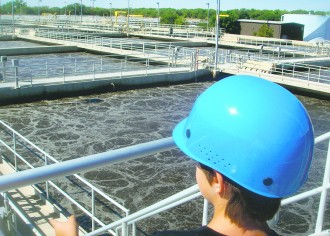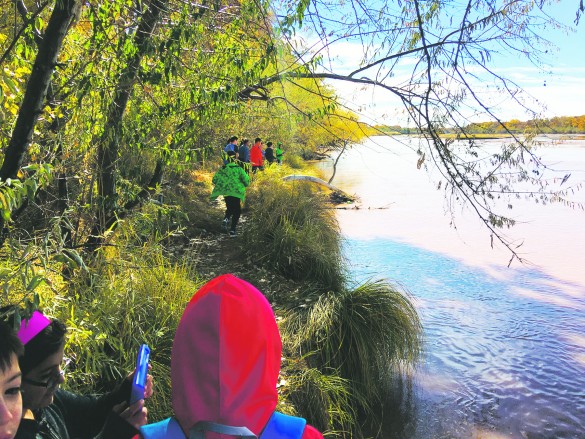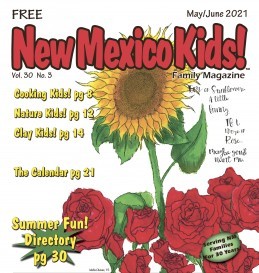Teaching Water Conservation
Teaching Water Conservation
October 26, 2022By GWYNNE ANN UNRUH

If your child goes to Albuquerque Public Schools (APS), chances are they know Erin Keck, her team of water resource educators and Jack and the Conservation Critters, their puppets.
Keck is director of the Albuquerque Bernalillo County Water Utility Authority’s (ABCWUA) educational program. She has combined her love of the outdoors and teaching to create an award-winning, free educational program offered to APS students of all ages. The water conservation team offers the program to nearly 20,000 students each year. They try to make classes “mostly really funny, fun and interactive, but they’re always focused on water and water conservation,” Keck said. An online educational curriculum also is available to teachers, students and parents.
“I have five amazing educators who are all environmental activists, really passionate about what they do and phenomenal teachers,” Keck said. “Everything starts with educating children as young as possible, because they are the ones who will be the next generation making important decisions and policies that affect all of us.”
ABCWUA’s free educational program includes puppet shows geared to younger students, classroom science activities, a half-day field trip and tours of a wastewater treatment plant.
“The field trip to the bosque is the heart of our program,” Keck said. “We take all of Albuquerque’s fourth graders to the river for an all-day field experience focused on taking care of the environment.”
The Rio Grande Bosque trip helps students understand how to become good stewards of New Mexico’s limited water resources. How the bosque has been impacted by people and the ecology of the cottonwood forest is presented as a personal experience.
“I’m surprised how many kids get off the bus for the field trip who have very little experience outside and have never been to a river,” Keck said. “We hope that they will fall in love with nature a little bit and be amazed, surprised and excited when they're down there. Once they make that connection and establish their place, I think they start to care more about those resources and understand their importance and how it affects them directly. One of the things we talk about on the field trip is how we've altered the river with dams and levees and the effect that's had on the river and the bosque ecosystem.”
The teaching team also offers free hands-on classroom presentations for grades 1 through 12. They bring everything needed to their classes to involve students in a 45-minute science activity. The activity’s focus, Keck said, is on “water: make a mess, teach something, clean up and leave only smiles behind.”

Every year Keck writes a new puppet show which she and her colleagues perform for students in kindergarten through second grade. Students sing, dance and laugh while learning about the importance of water in the desert.
“Last year we had the Rio Grande Mermaid, which was great,” Keck said. “She didn't have much to swim in this year. That was the issue. When I saw the river dry one day this summer, I cried. I was a kid when we moved here in 1978. I remember going up to the river thinking it was such a powerful river.”
The puppet show lasts about 30 minutes. Students receive a free coloring book to remind them what they learned. Puppet shows also can be watched online. The coloring book and an instructional video, “How to Make a Water Dragon Out of a Pizza Box,” can be downloaded for free.
“I truly enjoyed the show on water conservation,” said Steven Tognoni, principal at East San Jose Elementary School after watching the puppet show. “(It) works great with children. I would highly recommend the program to any school in APS.”
Two-hour tours of the Southside Wastewater Reclamation Plant show students how wastewater treatment plants clean about 50 million gallons of wastewater a day.
They look at activated sludge under a microscope to see microorganisms that clean the water. They follow the wastewater path as it is cleaned, and as students stand on the banks of the Rio Grande, where the cleaned water is released into the river, they discuss current wastewater issues. The tour is free, but participants provide their own transportation to and from the treatment plant. Tours are offered to grades in middle school, high school and college, but adults can also schedule a tour when they are offered.
During the pandemic lockdown, Keck expanded the online curriculum. “We live-streamed the puppet show for people, created tons of online activities and content and created a live-stream virtual field trip experience of the bosque,” she said.
The team portrayed various characters who popped out of the bosque cottonwood forest. “One of us was a cottonwood tree, one of us was a porcupine and another a poop fairy who talked about what introducing dog poop to the environment does,” she said.
“What we're hoping is that teachers don't just have this one-time experience that’s completely isolated,” Keck said. “There's lots of content online they can utilize before or after our activities that is really fun.”
Virtual offerings include interactive tours of drinking water or wastewater treatment plants, educational videos, a walk in the woods and online curriculum with resource links . The educational materials are provided free of charge to New Mexico residents and are ideal for use in the classroom, home school, adult literacy programs and informal education programs.
“We live in a desert. We don't have a lot of water and all of us need to do our part to take care of it,” Keck said. “We hope that students may have the opportunity to get visits and experiences multiple times throughout their schooling, as each time they see us, hopefully they deepen their understanding of the importance of water. We also think it's really important that they develop a sense of place and connection with nature.”
To schedule a presentation or book a tour, contact Erin Keck at 505-289-3027 or email ekeck@abcwua.org. More info: abcwua.org/education.

